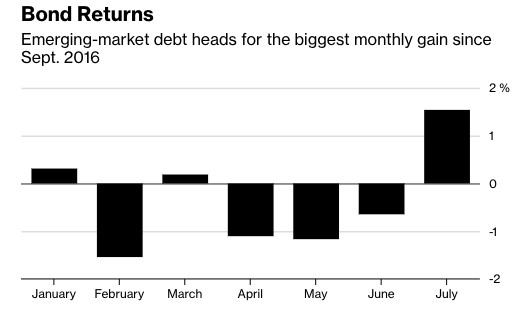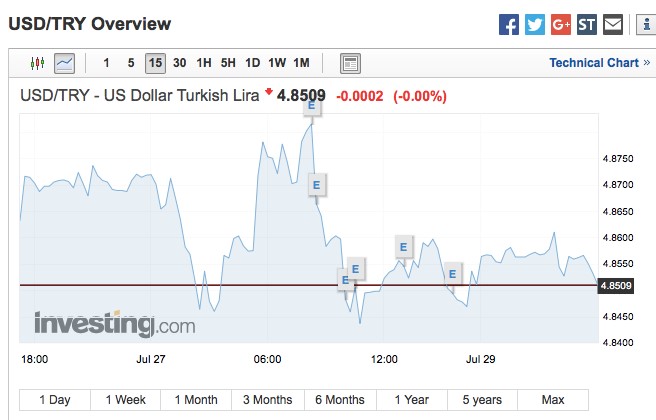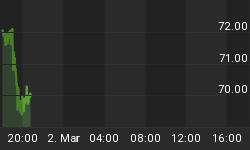Emerging markets have suffered a lot of pain in the past two quarters, and even though July saw them pare some losses, key elections are looming, and risk seems to be on the rise. So much so that even one-time emerging market cheerleader BlackRock is pulling out.
When the world’s largest asset manager withdraws from emerging markets, it’s a dire sign.
In recent months, Reuters reports that BlackRock bond investor Rick Rieder has cut his emerging markets exposure by half, citing fears that the dollar could “potentially continue to grind higher”.
Rieder is BlackRock’s chief investment officer, and he thinks it’s “prudent to run a smaller exposure” right now, he told Reuters.
How small, exactly? Of the $35.7-billion Strategic Income Opportunities Fund Rieder manages, he’s slashed emerging markets to a dim 7 percent—down from 17 percent in February.
Right now, it’s all about liquidity seeping out of bond markets.
So far this year, the U.S. dollar has gained 3 percent against its major trading partners.
And a trade war is bound to make emerging markets much risker.
Even though emerging market bonds are poised to see their first gains in months, a symphony of events is likely to keep the pain from subsiding any time soon.

(Click to enlarge)
Indeed, client portfolio manager Zsolt Papp at JPMorgan Chase & Co. sees another correction potentially coming between now and October, Bloomberg reported.
“If it is stabilization, we’re in early stages of it. There is still a tail risk that volatility will stay high,” Papp told Bloomberg.
Geopolitically, there’s no visible light at the end of this tunnel. The trade war has trampled on investor confidence and rendered everything riskier than ever. Suddenly, investors aren’t nearly as ravenous for developing nation assets. Related: Support Is Growing For Bitcoin ETF
Domestic politics is playing a role, too, Turkey to Argentina.
More pain is on the way for both, and they’re not alone. In Turkey, new rumblings from Washington threaten sanctions, and the Lira is under mounting pressure.
Turkish President Recep Erdogan, who recently cemented his authority in new elections, is overstepping in his control of the country’s monetary policy. Inflation is skyrocketing and the central bank might lose its independence. Indeed, it hasn’t helped that Erdogan has appointed his son-in-law as the new treasury and finance minister. While everyone expected Turkey’s finance chiefs to raise interest rates, they did nothing, and investors responded with a selloff of the lira and other Turkish assets.
The Turkish lira is in a downward spiral. Last week, on the threat of U.S. sanctions, the lira was in a freefall.

(Click to enlarge)
The lira has depreciated 21 percent against the dollar and the yield on 10-year government bonds has risen by 727 bps year-to-date. All investors see here is unsustainable growth.
Argentina is also reeling. It’s peso is the worst-performing major currency this year, and it’s had to take on a $50-billion line of credit from the IMF to stay afloat. The country has seen average annual inflation rates of more than 25 percent, which prompted the Central Bank of Argentina to raise the interest rate on pesos from 27.25 percent to 40 percent—a record-breaker.
Investors started massively withdrawing from emerging markets most notably in May, and the trend picked up momentum the following month, with reports saying that they withdrew some $10 billion in June. July might see a smaller withdrawal, but the consensus seems to be that it would only be a temporary reprieve, if anything.
By Charles Benavidez for Safehaven.com
More Top Reads From Safehaven.com
















